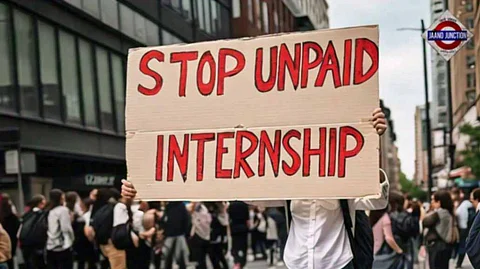

There are numbers of student & graduates who are keen to add on “internship period’ in their resumes. Internship is often considered a very essential element in a student’s college-time education, specially for career. So much so that most institutions in India and abroad have the provisions of credits attached to it, without which, the degree or course of the student may not be considered completed.
Many media-students who are seeking and searching for internships have claimed that they are not able to join certain media institutions for internships because even companies are not willingly accepting them and if they do, some even ask for a fee.
Then comes the concept of unpaid-internships, where the company may intake the students as interns but neither they pay nor they ask for any fee.
For some companies, internship period of a student is also their opportunity to scout for there next superstar employee so that they can find new and fresh workforce, who may turn out to be more productive. Some media companies employ unpaid intern because they don’t have to pay stipend amount to them and in return the student can also obtain their internship experience certificate – which for some may perceive as a win-win situation.
There are students who are not financially stable -- some hardly manage to pay the fees of college. Families of such are in hope that their child will one day take-up all the responsibility of the whole family.
No doubt, that internship or certificate of experience will bring advancement in career and advantages in future possibilities. It serves the student for better employability, recognition and industry exposure.
In a New York Times opinion piece in 2012, Charles Murray excellently portrayed how unpaid internships pose a significant challenge to students from lower-middle-class backgrounds, especially in the cases where they need to relocate. He writes about unpaid internships.
“It amounts to career assistance for rich, smart children. Those from the middle and working class, struggling to pay for college, can’t afford to work for free. Internships pave the way for children to move seamlessly from their privileged upbringings to privileged careers without ever holding a job that is boring or physically demanding.”
Paying the intern will generate a self-esteem which, in turn, may make them more responsible and accountable for the work they do; and further motivate them to produce higher quality work.
In most cases, once the training period of internship ends, not all the students are selected as staff. Companies should aim on compensating the students for the work and time they have invested during the period.
Media houses need to understand that ‘exposure’ is not enough and compensation is required too. As interns stay in an organization for a short time, with much less experience, hiring them will not be a very good decision for every employer, and I completely agree to it. Not paying them while hiring them as an intern is not justified and the practice of stipend/compensation must bring about change in the media organisations.
